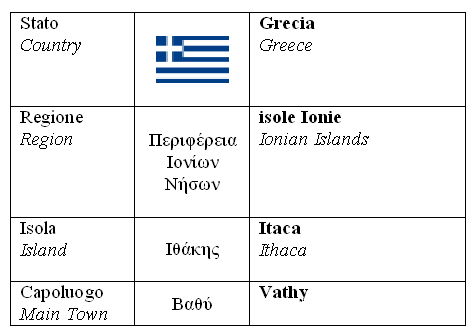 Greece, in the Ionian Islands Ithaki Where sailing was born

L’isola di Itaca (Ithaki è il nome greco traslitterato) ha conosciuto la sua maggiore gloria e potenza intorno al 1000 a.C., quando il regno di Itaca era costituito da tutte le isole e da una parte della costa dell’Acarnania, sulla terra ferma greca.
I primi antichi invasori delle isole furono i Micenei che hanno lasciato tracce significanti.
Durante la guerra di Troia fu il regno dei leggendari re Laerte ed Ulisse: Itaca è universalmente nota per essere stata, secondo la leggenda, la patria dell'eroe leggendario Ulisse (Odisseo) e per esservi ambientata l'Odissea, il celeberrimo poema di Omero.
Secondo alcuni studiosi Itaca potrebbe essere la patria di Omero stesso.
I Romani occuparono l'isola nel II secolo a.C., ed in seguito essa divenne parte dell'impero Bizantino.
I Normanni regnarono su Itaca nel XII e XIII secolo, e dopo un breve periodo di dominazione turca cadde nelle mani dei Veneziani.
In seguito Itaca fu occupata dalla Francia alla fine del XVIII secolo e nel 1809 fu conquistata dal Regno Unito.
Tra 1800 e 1807 fece parte della Repubblica delle Sette Isole Unite, sotto protettorato russo-ottomano ma a guida italo/veneto-greca.
Fu questa la prima esperienza di autogoverno greco, in cui ebbero un ruolo principale i greco-Veneti, tra i quali Giovanni Capodistria.
Nel 1864 è entrata a far parte della Grecia.

Exogi, la parte nord di Ithaca - Exogi, north side of Ithaca 
Paesaggio di Itaca - Ithaca landscape
Oltre al capoluogo Vathi, compongono il comune le seguenti località: Aetos, Afales, Agios Ioannis, Agia Saranta, Anogi, Exogi, Frikes, Kalivia, Kathara, Kioni, Kolieri, Lachos, Lefki, Marmaka, Perachori, Piso Aetos, Platrithia, Rachi, Stavros.

Vathy
Ithaca or Ithaka (Greek: Ιθάκη, Ithakē) is an island located in the Ionian Sea, in Greece, with an area of 45 square miles (120 km2) and a little more than three thousand inhabitants.
It is also a separate regional unit of the Ionian Islands region, and the only municipality of the regional unit. It lies off the northeast coast of Kefalonia and to the west and within sight of continental Greece.
The municipality of Ithaca includes some islets as well. The capital, Vathy or Ithaki, has one of the world's largest natural harbours.
Modern Ithaca is generally identified with Homer's Ithaca, the home of Odysseus, whose delayed return to the island is one of the elements of the Odyssey's plot.
During the Mycenaean period (1500–1100 BCE), Ithaca rose to the highest level of its ancient history.
Mostly based on the Odyssey and oral traditions, it is believed that the island became the capital of the Ionian Kingdom-State, which included the surrounding lands, and was referred to as one of the most powerful states of that time.
The Ithacans were characterized as great navigators and explorers with daring expeditions reaching further than the Mediterranean Sea.
The epic poems of Homer, the Iliad and the Odyssey, shed some light on Bronze-Age Ithaca. Those poems are generally thought to have been composed sometime in the 9th or 8th centuries BC, but may have made use of older mythological and poetic traditions; their depiction of the hero Odysseus, and his rule over Ithaca and the surrounding islands and mainland, preserve somes memories of the political geography, customs and society of the time.

Il pergolato - Grapes pergola 
L'asino sopra la casa - Donkey on the roof
Communities and villages:
Aetos, Afales, Agios Ioannis, Agia Saranta, Anogi, Exogi, Frikes, Kalivia, Kathara, Kioni, Kolieri, Lachos, Lefki, Marmaka, Perachori, Piso Aetos, Platrithia, Rachi, Stavros, Vathy/Ithaki.

Perachori, Ithaki, da sotto - from the bottom up

Perachori, Ithaki, da sopra - from the top down 
Lungomare di Itaca - Ithaca by the sea
Home ideas and experiences    |










